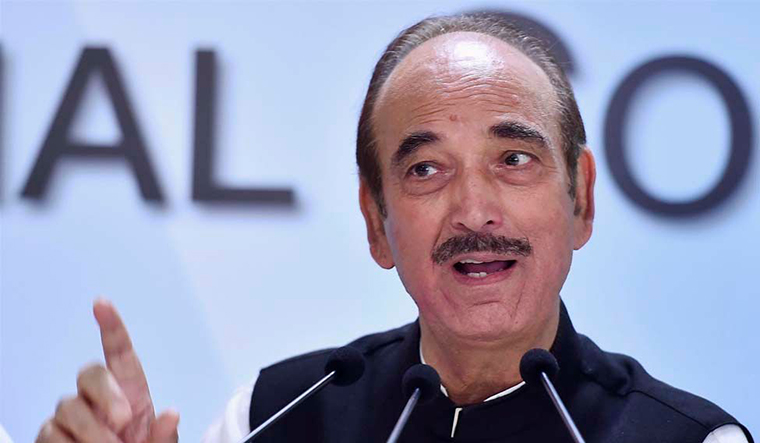Ehsan Fazili
During his maiden tour of Jammu and Kashmir for nearly two weeks, days after quitting Congress party, Ghulam Nabi Azad has addressed three public rallies drawing an outline of his future political strategy on the home turf. Before he goes ahead with his balanced and development-oriented agenda, which he has indicated, Azad would be finalizing the nomenclature of his party.
Even as he has spent about five decades in the Congress party and more than four decades at the national level, the erstwhile State of Jammu and Kashmir is not new to him. He has roots in J&K, wherefrom he was elected to the Rajya Sabha a number of times. He was also elected to the Legislative Assembly of erstwhile State of Jammu and Kashmir in by-elections from his home constituency of Bhaderwah in Jammu region on April 2006, months after taking over as Chief Minister from Mufti Mohammad Sayeed on November 2, 2005, under PDP-Congress coalition agreement. His tenure of three years was cut short by about three months in the wake of Amarnath land row that struck Kashmir and Jammu divisions in opposing directions. Azad’s tenure as the Chief Minister brought him closer to political and administrative issues and the situation at the grass-roots level. As J&K PCC President earlier, Ghulam Nabi Azad had also been directly connected to J&K, though with the affairs of the Congress party.
If the challenges before Azad as Chief Minister between 2005 and 2008 were like flocking together members of coalition partners, the Congress and PDP, and to run the administration, these are different in the present scenario of the post-August 5, 2019 era. He has come out of the grand old national political party and is testing the waters in his home turf that demands to tackle varied issues with a comparatively new party structure to fit the political landscape of the UT of J&K. He has got most of his former senior Congress party colleagues into his fold in both the Jammu and Kashmir regions. They include former Deputy Chief Minister Tara Chand from Jammu and former PCC President and former minister, Peerzada Mohamad Syed and former Minister, Taj Mohiuddin from Kashmir valley. Azad, in his recent tour, had also meetings and interactions with several former Congress leaders and workers apart from political workers from other parties. This exercise is aimed at sharing his strategy on the changed political ground in the UT, where separatists’ voice has been on the low ebb while the mainstream political parties like the National Conference, PDP, the Congress and others are struggling to remain relevant on the ground.
Under the changed political scenario during the past three years traditional political parties united under the new mechanism of things giving rise to the People’s Alliance for Gupkar Declaration (PAGD) led by Farooq Abdullah that was constituted on August 4, 2019 by eight political parties. The parties included NC, PDP, Congress, CPM, Awami National Conference and People’s Conference. It came into being a day before the Government of India withdrew the special status of Jammu and Kashmir. Thus, the main agenda before J&K’s political parties over the past three years has been restoration of Article 370 and the Statehood. These parties believe that restoration of Article 370 was not “immediately possible” without a two-thirds majority in the Parliament. The National Conference on August 11, 2019 approached the Supreme Court of India challenging the withdrawal of special status to Jammu and Kashmir. The party is of the view that restoration of Article 370 was “impossible under the present situation”, it has resolved to continue the struggle for its restoration and Statehood to J&K. The Apni Party, led by former minister, Syed Altaf Bukhari, constituted on March 8, 2020, merely seven months after the abrogation of Article 370, believes that “what has been done cannot be undone” vis-à-vis abrogation of Article 370 and runs its campaign for the restoration of Statehood.
It is in this political scenario, which has emerged in J&K post August 5, 2019 and a long wait for Assembly elections that Ghulam Nabi Azad is to test his waters. The opposition parties in Jammu and Kashmir have clearly indicated that Azad’s political outlook on Kashmir was no different from the BJP and Prime Minister Narendra Modi.
No Assembly elections were held in J&K after 2014, as the PDP-BJP coalition Government collapsed by withdrawal of BJP support on June 19, 2018. That was followed by the Governor’s rule and subsequently stripping of the special status to Jammu and Kashmir and its division into two UTs of J&K and Ladakh. Of the two UTs under the new structure, only J&K has to have an elected Assembly. With the ongoing revision of electoral rolls, which is to be completed by October 31, it is indicated that the Assembly elections are going to be held after the winter ahead.
The major players in the Assembly elections thus, would mainly comprise Ghulam Nabi Azad leading his new party and Farooq Abdullah, President of the National Conference, who also heads the multi-party PAGD. Other players include the PDP’s Mehbooba Mufti, Apni Party led by Altaf Bukhari and People’s Conference of Sajad Lone. The Assembly elections ahead would be the first after the grass-roots level Panchayat and Urban Local Bodies elections held in November-December 2020.
Trending Now
E-Paper


